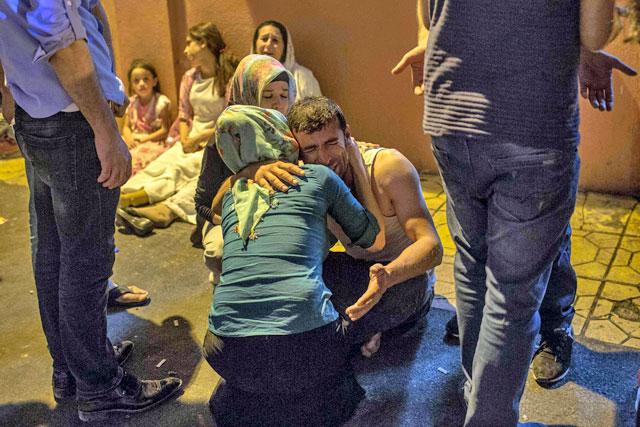You are here
Istanbul bomber identified as Turkish member of Daesh
By Reuters - Mar 20,2016 - Last updated at Mar 20,2016
ISTANBUL — A Turkish member of the Daesh terror group was responsible for Saturday's suicide bombing in Istanbul that killed three Israelis and an Iranian and wounded dozens of others, Turkey's interior minister said.
Efkan Ala identified the bomber as a man born in the southern province of Gaziantep, adding that five people had been detained so far in connection with the bombing.
"We have determined that Mehmet Ozturk, born in 1992 in Gaziantep, has carried out the heinous attack on Saturday in Istanbul. It has been established that he is a member of Daesh," Ala told a news conference broadcast live on television.
Israel has confirmed that three of its citizens died in the blast. Two of them held dual citizenship with the United States. An Iranian was also killed, Turkish officials have said.
Israeli Prime Minister Benjamin Netanyahu has said Israel is trying to determine whether its citizens were deliberately targeted. Eleven of the 36 wounded were Israelis.
Saturday’s attack on Istiklal Street, Istanbul’s most popular shopping district, appeared similar to a January suicide bombing blamed on Daesh that killed at least 12 German tourists in the city’s historic centre.
More than 80 people have now been killed in four suicide attacks so far this year in Turkey, a NATO member that faces multiple security threats.
As part of a US-led coalition, it is fighting Daesh in neighbouring Syria and Iraq. It is also battling Kurdish militants in its southeast, where a two-and-a-half year ceasefire collapsed last July, triggering the worst violence since the 1990s.
The spate of bombings has raised questions about Turkey’s ability to protect itself from a spillover of both the Syria and Kurdish conflicts.
An offshoot of the militant Kurdistan Workers Party (PKK) claimed responsibility for two recent car bomb attacks in the capital Ankara that killed a total of 66 people. Turkey sees the Kurdish insurgency as fuelled by the territorial gains of Kurdish militia fighters in northern Syria.
High alert
Police were questioning the father and brother of the alleged bomber Ozturk and had determined his identity by checking a DNA sample from the blast scene against one taken from his father, security sources said.
Ozturk’s family reported him missing after he went to Istanbul in 2013, the security sources said.
Police were on high alert on Sunday after the previous day’s attack and due to concerns about potential clashes between security forces and Kurdish militants during a spring festival this weekend that is widely celebrated by Kurds.
The United States and some European embassies had warned their citizens to be vigilant before the Nowruz celebrations.
Interior Minister Ala said authorities had put 200,000 members of the police and gendarmerie on duty, some of whom would set up checkpoints. Hundreds of bomb control devices had also been dispatched.
But he acknowledged the difficulty of catching lone suicide bombers.
“We have to take all measures to prevent any terrorist acts,” he said. “But sometimes there are suicide bombings that are hard to prevent.”
‘We are here’
Streets across the city, usually bustling with traffic and pedestrians on Sundays, were eerily quiet apart from the sound of police helicopters buzzing overhead.
Istiklal, quiet earlier in the day, was no longer deserted by afternoon. Crowds gathered at a makeshift memorial at the site of the bombing, where mourners hung the red and white Turkish flag from buildings and laid carnations next to handwritten signs that read: “We are here. We are not afraid.”
A small group of lawmakers from the Peoples’ Democratic Party, the Kurdish-rooted opposition party, were scheduled to walk to Istanbul’s Bakirkoy district for Nowruz celebrations. Roads in that area were being closed by police for security reasons, Anadolu Agency reported.
Social media sites such as Twitter and Facebook were not readily accessible, local users reported. Authorities have blocked access to such sites after bombings in the past, usually because graphic images have been shared online.
It was not immediately clear whether Germany, which closed its diplomatic missions and German schools last week citing a security threat, would open them on Monday. A foreign ministry spokeswoman said the decision would be made at short notice.
Related Articles
ISTANBUL — President Recep Tayyip Erdogan said on Monday Turkey would use all its military and intelligence might to battle "one of the bigg
DIYARBAKIR, Turkey — Turkey's Kurds on Monday marked the annual spring festival of Nowruz with a call for the resumption of peace talks betw
GAZIANTEP, Turkey — At least 51 people were killed when a suicide bomber aged between 12 and 14 attacked a wedding party in the Turkish city


















